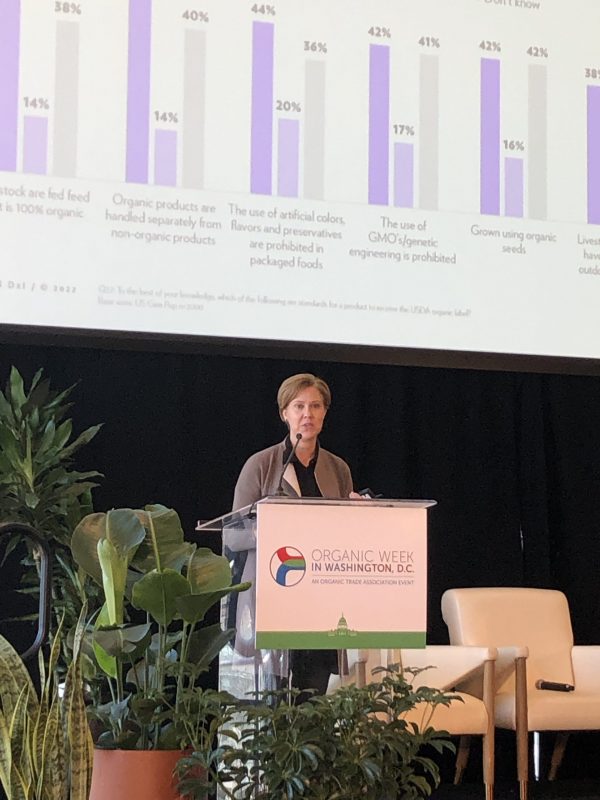Consumers need a go-to source of reliable information about organics
Building consumer trust in organics and continuously improving organic standards were key themes at the Organic Trade Association’s Organic Week event held at the end of March in Washington, DC. Darci Vetter, global head for policy and government relations at the Nature Conservancy, presented findings from Edelman’s Trust Barometer, and a group of organic food company executives held a panel discussion about fostering trust in organics.
With growing concerns about—and several confirmed incidents of—fraud in the organic industry, building consumer trust in organics is crucial.
Lack of knowledge about the standards and go-to information source
Vetter, who is also the daughter of pioneering organic farmer David Vetter, said the purpose of the Edelman Trust Barometer was to understand how consumers interact with organic and how they understand the organic industry. The report involved a survey of 7,500 consumers across six markets including the U.S., United Kingdom, France, Germany, Japan, and United Arab Emirates.
The report found that 79% of Americans are concerned with the use of chemicals in agriculture, a core attribute of organic food production with its prohibition of synthetic pesticides and fertilizers.
When asked about organic products, 68% of survey respondents said they don’t contain pesticides, 65% said they are healthier than conventional products, and 64% said they don’t contain GMOs.
Despite that, Vetter said consumers “aren’t knowledgeable about specific organic standards. More than half didn’t know what is in the standards.”
Still, most American consumers, 55%, have a high level of trust in organics. More than three-quarters, 79%, of the so-called “food forwards,” who are familiar with and more likely to purchase organics, were even more trusting of organics. But 25% of Americans are neutral about organic products.
Vetter said that Americans lack a go-to source of information about organic products and are primed for disinformation. They get information about organics from friends and family, social media, food and cooking publications and government.
“Only a quarter of Americans strongly believe there is enough accessible, easy to understand information about organics,” she said.
This creates an opportunity for the organic industry to establish a go-to information source.
The report also said that Americans’ expectation is that organic standards are updated regularly to keep pace with evolving understandings about soil, climate, toxicology, animal welfare, and other areas.
And as new labels such as regenerative start to appear on foods, organic needs to make it known that it is the foundation.
In summarizing the report, Vetter said: “Trust in organics is being held back by a lack of familiarity.” There is a lack of familiarity with the standards as well as a lack of a reliable information source about organics.
She also said there is an opportunity to expand organics with more inclusion and by addressing climate change challenges.
“Trust has to continue to be earned”
Fostering trust in organics was the focus of a panel discussion with several executives of organic food companies. These included Walter Robb, executive-in-residence at S2G Ventures and former co-CEO of Whole Foods Market; David Will, vice president of sales at Chino Valley Ranchers; Roma Craig, vice president of impact and communications at Clif Bar & Company; and Brenna Davis, CEO of Organically Grown Company.
Robb said that the Organic Foods Production Act of 1990, which led to the development of the National Organic Program, helped “mainstream organics.” But he and other panelists said the organic industry is now being challenged.
“The seal hasn’t grown with us,” Will said. “As you stand in front of the egg case, you see many labels. There’s been a constant degrading of the (organic) label.”
The need for continuous improvement of the organic standards was emphasized by all the panelists. Davis said consumers expect the organic seal to be continuously improved but it hasn’t been.
“It really erodes trust when it takes so long to get things like the Origin of Livestock Rule approved. The continuous improvement piece matters, and consumer trust hinges on it.”
The Origin of Livestock Rule, which is the guideline for transitioning conventional dairy livestock to organic dairy production, took seven years to become law.
Davis also said consumers expect that farmworker protection is part of organic. “There’s so much more around farmworker protections that can be done.”
Will said it is easier to update the U.S. Constitution than it is to improve the organic standards. “The organic seal needs to progress. It’s a living document.”
Robb asked the panelists what needed to be done to evolve the organic standards. Davis and McCraig both cited farmworker equity. Davis said organic should be recognized as being a “climate smart” system of producing food.
“Climate is the issue of our times. We have to be at the table on climate smart agriculture,” she said.
The panelists addressed the growing regenerative agriculture trend. McCraig called regenerative the “new shiny object.”
“I’m a regenerative skeptic,” Davis said. “If the National Organic Program had kept up with consumer demand and rules like Origin of Livestock, we wouldn’t have had these other labels. We should have kept up.”
Robb said consumer trust is vital to the future of the organic industry. “It needs to be grown to a new generation of customers. Trust has to continue to be earned.”





